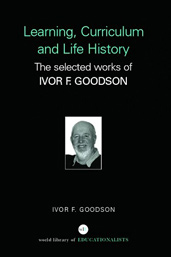Learning, Curriculum and Life Politics: the selected works of Ivor F. Goodson
Nations at Risk
Seeking in turn to challenge and redirect these reforms and intentions the political right has argued for the rehabilitation of the 'traditional' (i.e., grammar school) subjects. The national curriculum can be seen as a political statement of the victory of the forces and intentions representing these political groups. A particular vision, a preferred segment of the nation has therefore been reinstated and prioritized, and legislated as 'national'.
The historical continuities evident in the national curriculum have been commented on in a number of places. For instance, the Times Educational Supplement stated that 'the first thing to say about this whole exercise is that it unwinds 80 years of English (and Welsh) educational history. It is a case of go back to Go' (Times Educational Supplement, 1989). In writing of the National Curriculum Project, Moon and Mortimore commented:
The legislation, and the much-critized consultative document that preceded it, present the curriculum in needlessly rather restricted terms. Thus the primary curriculum was put forward as if it were no more than a pre-secondary preparation (like the worst sort of 'prep school'). All the positive aspects of British primary schooling so valued by HMI and the Select Committee of the House of Commons and so praised by many foreign commentators were ignored.
The secondary curriculum, in turn, appears to be based on the curriculum of a typical 1960s grammar school. We would not take issue with the subjects included, but we believe that such a curriculum misses out a great deal. Information technology, electronics, statistics, personal, social and careers education have all been omitted. Yet, surely, these are just the areas that are likely to be of importance for the future lives of many pupils? (Moon and Mortimore, 1989).
The national curriculum then can be seen as a response to a 'nation at risk' at two levels. Firstly there is the general sense of the nation-state being in economic decline and subject to globalization and to amalgamation in the wider European Community. There the response is paradoxical. Nation-building curricula are often favoured over commercially 'relevant' curricula. The solution therefore may exacerbate the problem. Further economic 'decline' may follow leading to even more desperate attempts to reassert national identity.
Secondly, given that the UK is clearly a divided nation, investigation of the national curriculum allows insights into precisely which nation is at risk. It would seem it is the elite and middle class groups which were perceived of as 'at risk'. For it is this group that have the greatest historical connections to the 'traditional subjects': these subjects have been revived and reinstated in the national curriculum.
The perception of nations at risk and social groups at risk has further provided one source of support for developing the powers of central state over the school curriculum. This is the third level at which the national curriculum is significant. In the central project of rebuilding the nation-state, the issue of re-establishing national identity and ideology has been dealt with but there remains the issue of rebuilding the power of the nation-state itself.
